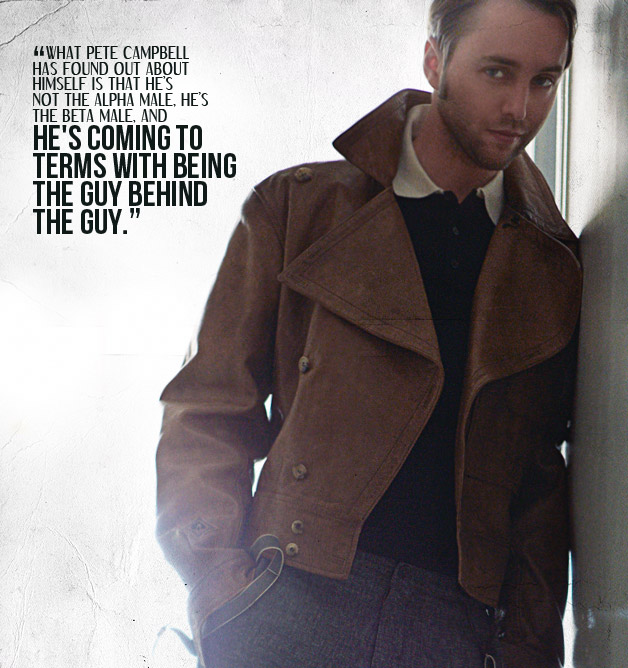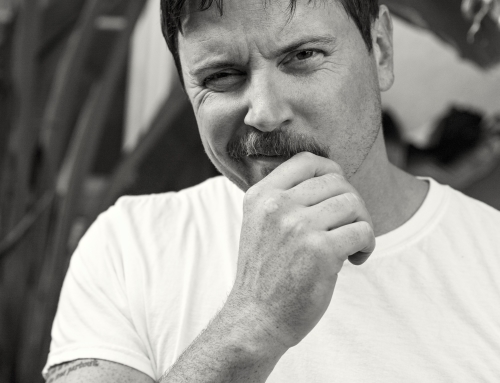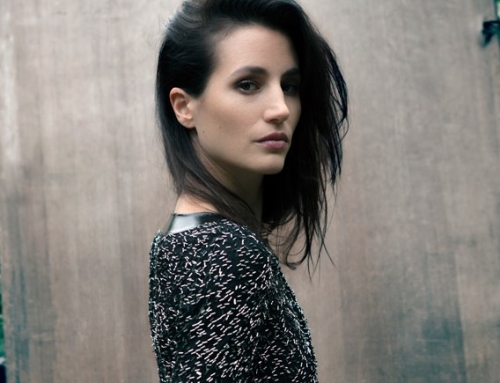There’s something about Vincent Kartheiser that makes you want to purchase a broken-down used car from him. The combination of his calm, protracted speech and the boyish innocence of the 33-year-old actor’s face, are so one immediately wants to buy whatever Kartheiser is selling.
“I’ve gotten out of lots of trouble, but usually not by my trusting ways,” teases the actor during our interview.
Kartheiser’s natural talent for persuasion is put to good use in his role as the artful adman, Pete Campbell, on AMC’s Mad Men. Going into its sixth season — premiering April 7th — the drama’s plot has seen Pete evolve from cocky upstart to complacent partner at Sterling Cooper Draper Pryce advertising agency, all the while further dimming the lights on Pete’s dark side the higher up the ladder he climbs.
From visits to brothels to an extramarital affair with the emotionally unstable Beth Dawes (Alexis Bledel) — wife of his suburban commuter buddy — right down to the low low of prostituting his co-worker Joan (Christina Hendricks) in order to land an account, season five of Mad Men made it near impossible to not want to pummel ol’ Pete, Lane Pryce (Jared Harris) style.
The series’ dark angel, Kartheiser’s Pete Campbell is the rouge audiences love to hate, but yet also can’t help but feel concerned for, a phenomenon the actor credits to the writers.
“I would say that Matthew Weiner and the writing team do a good job at kind of fluctuating Pete back and forth,” he says. “Making him somebody that the audience despises and at different times, someone the audience can root for or feel sympathy for.”
Kartheiser too adds to the balance, playing his character with the precise amount of vulnerability and uncertainty. The actor’s sophisticated and layered performance contributed to Man Men’s win at this year’s Screen Actors Guild Awards for Outstanding Performance by an Ensemble in a Drama Series, an award the actor has been nominated for two times previously and won initially back in 2008 for his performance in Mad Men‘s first season. That same award season, Kartheiser also picked up Breakout Performance of the Year at the Young Hollywood Awards, an accolade previously presented to actors including Jake Gyllenhaal in 2002.
Dark characters like Pete Campbell are something the young actor has grown accustomed to playing. “If it wasn’t for my ability to go to dark places, than I probably wouldn’t have any career at all,” he declares.
A magnet for the disaffected, when not trudging through the murky flip side of the privileged white suburban male’s life in the ‘60s, the actor finds himself in roles like last year’s stage production of Jonathan Marc Feldman’s Death of the Novel, in which he played the emotionally anguished Sebastian Justice, an agoraphobic novelist.
http://www.youtube.com/watch?v=TmHeHHeOjuw&list=PL5534FC45968C3712
With season six of Mad Men promising to be even more stirring than the previous one, we’re not sure how far down into the darkness we’ll see Kartheiser’s Pete go, but we’re eager to watch him deliberate his actions according to the new season’s theme: everyman for himself.
With a Screen Actors Guild Award in hand, a new fiancée (none other than Mrs. Dawes herself, Alexis Bledel), and Mad Men‘s highly anticipated season six premiere around the bend, the sun may not be shining on Kartheiser’s characters, but it is beaming down on him. Below, we chat to the actor about the evolution of Pete Campbell, and his never ending internal struggle with good and evil.

Let’s start off by talking about your character Pete Campbell. He’s done some pretty terrible things, but yet somehow it’s hard to completely hate the guy, why do you think that is?
The audience feels like he does the right thing sometimes. During season four, there were some moments he really did back Don Draper up, and he kind of came through…but then of course in season five, he did enough despicable things to get him back on their bad side.
Seems like a lot of what gets Pete into trouble is chasing things that are out of his reach, often that he doesn’t really even need. He sort of has a grass-is-always-greener-on-the-other-side perspective of life, no?
Yeah, he’s definitely malcontent. I think that every character has a bit of that…I would say Pete has more than many of the characters. There was a great line that Don Draper said, “What’s happiness? It’s the moment before you need more happiness.” And I think that’s the theme of the show…and a bit of a theme with the white American male from that generation; it was a byproduct of the late ‘40s and ‘50s…this American boom generation that really just felt that growth was the only form of success, and needed to keeping pushing forward or else they would decompose or something.
That’s definitely evident in the office mentality.
Pete does it in his personal life as well. During season five, he was looking very hard for a replacement: a mistress…for a steady lover on the side, although seemingly he has a caring and devoted wife already at home.
Are you at all like that? Grass is always greener…
I do not have that at all (laughing). I’m more like, “there is no grass on my lawn, and the next door neighbour should probably think twice about having grass on his lawn because it’s kind of a waste of water.”
You obviously know your character well. When playing him, do you understand Pete to be someone who is certain of who he is — a man behind his actions — or is he still unsure of his place?
That’s a really good question. I feel that he’s figured out who he is through the show, I think when we first met Pete Campbell he really didn’t know, he thought he should be doing creative work at the agency…he had all these preconceived notions about his position in the world.
And what were those?
He thought of himself as an alpha male and a sort of a charming presence, but the truth is what he found out about himself is that he’s much more a beta male than an alpha male, and he’s also coming to terms with being the guy behind the guy.













